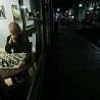Jamila Huseynova
asked:
Can anyone explain me why didn't they all run away from that place? Because I could not figure out that part.
To answer questions about
Never Let Me Go,
please sign up.
Daryl Anderson
I think this book was primarily about the power of culture. It is always most difficult to see the truth that is right in front of you. In his autobiography Frederick Douglass observed that when he was a slave, he could not understand slavery. Only after he escaped, did he comprehend the full horror of his enslavement. Enlightenment requires distance.
Catherine
It's the whole point of the book - that the characters accept the constraints that society has made for them - as do we all.
Christine Eakin
I found this answer elsewhere, but they explain it well, and the director of the movie explains it equally well:
"One of the consistent questions people have about the film is, "Why don’t they run away?" What would your answer be to that?
Maybe it’s a failing of the film that the question comes up as often as it does – I don’t know
There are many ways to answer the question because it’s a question that gets to the heart of what the movie is exploring. I’m always loathe to answer this question myself because if you were to ask this of Kazuo, his response is so astoundingly eloquent, I always feel, “Oh, darn: why do I have to answer this? Why can’t we get Kazuo on the phone?” Kazuo’s answer, in brief, is that there have been many films with stories about the kind of anomaly of brave slaves rebelling against an oppressive or immoral system, and he just isn’t as interested in telling that story as he was in the ways that we tend not to and the ways that we tend to accept our fates and the ways that we tend to lack the necessary wider perspective that would make that an option.
When I have shown the film to Russian audiences the question doesn’t come up. When I show the film to Japanese audiences, in Tokyo, the question doesn’t come up. There are societies where the process of that society and the reality of the atmosphere of that society is so pervasive, since birth, that people are raised to believe that it’s noble to, be a cog, really, and fulfil your destiny and your responsibility to the greater society. It’s just how these characters think. It’s a very western idea and a very American idea that a movie story is somehow broken if it’s not about a character who fights.
If you know Kazuo’s other books and if you’re able in the reading of a novel to immerse yourself in Kathy’s perspective to a greater degree than we were able to depict in a film... that question doesn’t come up when you’re reading the book. It’s... You can tell that it’s obviously about characters that lack that perspective and that the notion of running wouldn’t even occur to them – they’ve been brain-washed since childhood to believe that they’re lucky, that they’re privileged, that they’re providing an honoured, unique service to the society.
That’s just sort of the prosaic answer to the question. The whole idea of the film is really a metaphor. If you take it too literally then you would ask those questions but if you understand that the film is a rumination on the fact of the brevity of our lifespan then that question doesn’t really come up. And maybe it’s a failing of the film that the question comes up as often as it does – I don’t know. What was your feeling about it?
That we have the illusion of choice, but a lot of us don't run away... You could have had the obligatory scene where someone tries to run away, but I wouldn't want to see that film. Or, rather, I've seen that film...
Well, we suggested it, as Kazuo does - that a mythology, a rumour, rose in the school - over the years - that that would happen if someone tried to run away.
The story's writer Kazuo Ishiguro spoke to this issue in an interview at the film's launch:
He wasn't looking to tell the story of slaves who rebel.
He is fascinated by the extent with which people (when threatened by authority) remain passive.
The young people in the book simply don't have any conception of a world in which they can escape. They fail to find freedom because they lack "perspective"."
Link to the interview: https://www.youtube.com/watch?v=_jCB5...
"One of the consistent questions people have about the film is, "Why don’t they run away?" What would your answer be to that?
Maybe it’s a failing of the film that the question comes up as often as it does – I don’t know
There are many ways to answer the question because it’s a question that gets to the heart of what the movie is exploring. I’m always loathe to answer this question myself because if you were to ask this of Kazuo, his response is so astoundingly eloquent, I always feel, “Oh, darn: why do I have to answer this? Why can’t we get Kazuo on the phone?” Kazuo’s answer, in brief, is that there have been many films with stories about the kind of anomaly of brave slaves rebelling against an oppressive or immoral system, and he just isn’t as interested in telling that story as he was in the ways that we tend not to and the ways that we tend to accept our fates and the ways that we tend to lack the necessary wider perspective that would make that an option.
When I have shown the film to Russian audiences the question doesn’t come up. When I show the film to Japanese audiences, in Tokyo, the question doesn’t come up. There are societies where the process of that society and the reality of the atmosphere of that society is so pervasive, since birth, that people are raised to believe that it’s noble to, be a cog, really, and fulfil your destiny and your responsibility to the greater society. It’s just how these characters think. It’s a very western idea and a very American idea that a movie story is somehow broken if it’s not about a character who fights.
If you know Kazuo’s other books and if you’re able in the reading of a novel to immerse yourself in Kathy’s perspective to a greater degree than we were able to depict in a film... that question doesn’t come up when you’re reading the book. It’s... You can tell that it’s obviously about characters that lack that perspective and that the notion of running wouldn’t even occur to them – they’ve been brain-washed since childhood to believe that they’re lucky, that they’re privileged, that they’re providing an honoured, unique service to the society.
That’s just sort of the prosaic answer to the question. The whole idea of the film is really a metaphor. If you take it too literally then you would ask those questions but if you understand that the film is a rumination on the fact of the brevity of our lifespan then that question doesn’t really come up. And maybe it’s a failing of the film that the question comes up as often as it does – I don’t know. What was your feeling about it?
That we have the illusion of choice, but a lot of us don't run away... You could have had the obligatory scene where someone tries to run away, but I wouldn't want to see that film. Or, rather, I've seen that film...
Well, we suggested it, as Kazuo does - that a mythology, a rumour, rose in the school - over the years - that that would happen if someone tried to run away.
The story's writer Kazuo Ishiguro spoke to this issue in an interview at the film's launch:
He wasn't looking to tell the story of slaves who rebel.
He is fascinated by the extent with which people (when threatened by authority) remain passive.
The young people in the book simply don't have any conception of a world in which they can escape. They fail to find freedom because they lack "perspective"."
Link to the interview: https://www.youtube.com/watch?v=_jCB5...
Peter
I think that's part of why the novel ultimately fails. They can access a world of literature, and yet suicide and rebellion are beyond their imaginations. The internal logic fails with the psychological development of the characters being overly simplistic and too limited.
Mark
You have to take this book as an allegory on life. Let me put it this way to you. Look at your life. You were born and after a childhood of a mere fifteen years or so, you start preparing yourself for a life of employment, that means at least forty of the best years of your life going to work practically every day, day in day out with few occasional breaks. By which time your in your sixties, your body is starting to fail, and you spend the last few years of your brief life (provided you are still alive) in retirement, at last with enough time to do what you always wanted to do but in a body that is no longer able to do it....
So, now I ask you the question you just asked. Why don't you run away!
So, now I ask you the question you just asked. Why don't you run away!
Darren
There is a scene where the children mimic touching an electric fence, and one of the guardians remarks that these 'could do a lot of damage' or similar - which means electric fences were used at other facilities, but not Hailsham - at it was 'progressive'. What Hailsham obviously demonstrated was that fences weren't even needed. They were instilled with a fear of the unknown - told some scary stories when they're young - eg about a child who strays out of bounds, and is later found with hands and feet cut off. That combined with the sense of safety at Hailsham, and they just wouldn't want to leave.
Mark Johansen
Where would they go? It's pretty clear from the story that these people have little or no legal rights in their society. Maybe they could flee to another country and be given political asylum. The story doesn't say what the social and political situation in the rest of the world is. What would happen to someone who tried to run away and was caught? Your question is very much like asking, "Why didn't slaves run away?" Some slaves did, of course, but it wasn't easy. Someone could certainly have written a story that started out the same but ended with these people escaping or rising up in rebellion. But that would have been a very different story. What made the story so powerful to me was the way these people just accept their fate and DON'T try to escape or rebel. Whether because they know escape is hopeless, perhaps off-stage people have tried to escape and been caught and harshly punished, or because they've just been so indoctrinated that the idea of escape never occurs to them.
Laura
Replace 'organ donors' with '9-5 job, broken family and mortgage'. That's what I saw in this book. I saw it as a parallel to cultural indoctrination. Why do people stay in unhappy marriages? Why don't they try to change their job? Some do, but most don't. Most of us do what's expected of us. That's what I think the novel is about.
Jas
I would add to the ones about their being conditioned not to run that they have nowhere to go, not just in a literal sense but a symbolic one. It should register with further thought that the story is a parallel to everyone's experience. We all learn that we will die and are exposed to various stories designed to mitigate that, as if anything really does. No place is available to flee, though.
Leo Walsh
I brought it when they were kids and sheltered. They had no idea what the rest of the world was like.
But as they got older, and faced certain death via organ donations... I could see most falling into lock-step. That's human nature. It's a psychological concept called "learned helplessness," and there is little doubt that the narrator suffers from the affliction
But I was bothered by here being NO donor who would stand up to the system. Like Kunta Kinte on "Roots," the rebel need not win. He or she just needs to be there.
And then I remembered that this was a first-person narrative. Maybe there were rebels but she was unaware? Who knows...
But as they got older, and faced certain death via organ donations... I could see most falling into lock-step. That's human nature. It's a psychological concept called "learned helplessness," and there is little doubt that the narrator suffers from the affliction
But I was bothered by here being NO donor who would stand up to the system. Like Kunta Kinte on "Roots," the rebel need not win. He or she just needs to be there.
And then I remembered that this was a first-person narrative. Maybe there were rebels but she was unaware? Who knows...
Olivia
this is the the key concept in the book, that the characters accept mortality and their fate and this makes them braver then fighting for to accept suffering is far more difficult then running from it. we all come to a point in our lives where we stop fighting, whether it be on your deathbed or other circumstances however Ishiguro's book never let me go could be considered a failure by the many who do not grasp these concepts but really provides a different insight into a another point of view and that being the clones. Kathy, Tommy and Ruth knew inside all along that the deferal did not exist but they clung to hope as all humans do to exist. however behind that plain monotone narration of Kathy H's story she is really fuming with anger, at the unfairness of her eclipsed relationship with Tommy and her anger at her society, yet she accepts it which ultimately makes her human in my eyes and brave. Never let me go is not about a legendary battle between clones and Humans, it delves much further addressing questions such as what does is mean to be human or what is humanity. To fully understand the book i read it twice for at first i wondered why they would simply accept their fate without a fight, then i realised that never let me go is a book about acceptance of suffering, a question which all Religions have tried to solve, whether it be faith in god or for Buddhists faith in yourself. this, for me justifies Never let me Go as a great book however everyone interprets books differently. hoped that helped ! - Olivia, 14 (sorry for my random capitalisation, my keyboard is malfunctioning)
Susan
Children believe what they are told. It is a dangerous, but true, concept. They didn't run away from that place because they never pondered anything different.
Christopher Campbell
This answer contains spoilers…
(view spoiler)
Shea
The clones were kept in such a state of ignorance, they didn't even know the right questions to ask. They're kept separated from the rest of the world until they're carers, and when they're carers they're completely run ragged. Think about all the planning it would take to practically run away and what they could reasonably plan for. These are people who barely know how money works, and know only what they need to know about how society at large works. Add to it that they've really instilled obedience into them from a young age. None of the kids at Hailsham dared to go off property. When they moved into the cottages, it took them ages to even go out exploring.
Plus, they grew up knowing this was just how things were, and that they were special and important for fufilling this role. Think about their dreams. They didn't dream of avoiding donations, just deferring them. They didn't dream of being a doctor or a lawyer, but of working in a store or an office.
Beyond all that, there was the carer programme. It was rather ingenious. They were either selected right away to be a donor, by which time it's really too late. Otherwise they were a carer. As a carer, they saw they how important they were to others. They were also worked so hard they were constantly fatigued and stressed. While that's going on, everyone they knew and formed relationships with are starting their donations.
Think about Kathy. Would she even want freedom given the choice? Everyone she loves is dead. As exhausting as her job is, she absolutely loves it. Would she really find meaning like that in the real world? Would she ever be able to form normal relationships with people? Of course, that's why she was allowed to live so long. She wasn't the type to run off or cause problems.
Plus, they grew up knowing this was just how things were, and that they were special and important for fufilling this role. Think about their dreams. They didn't dream of avoiding donations, just deferring them. They didn't dream of being a doctor or a lawyer, but of working in a store or an office.
Beyond all that, there was the carer programme. It was rather ingenious. They were either selected right away to be a donor, by which time it's really too late. Otherwise they were a carer. As a carer, they saw they how important they were to others. They were also worked so hard they were constantly fatigued and stressed. While that's going on, everyone they knew and formed relationships with are starting their donations.
Think about Kathy. Would she even want freedom given the choice? Everyone she loves is dead. As exhausting as her job is, she absolutely loves it. Would she really find meaning like that in the real world? Would she ever be able to form normal relationships with people? Of course, that's why she was allowed to live so long. She wasn't the type to run off or cause problems.
Grady Griffin
There are great answers here and I agree with them all. I believe there is a great degree of psychological imprisonment established. But why are there no considerations that our characters are physically imprisoned too? The entire region could be a sort of penal colony. Other people, non-donors, are there merely to support the economics of the area. There are no other young people there. This is how the donors are easily identified. All the media could be easily controlled. In fact, how do we know the year? From the unreliable narrator? Could be, in this bubble, an establishment of the past is easier to construct. We could be decades from the stated time period. Discarded items and technology would be cheap. Cheap enough to just give to the students. This gives an explanation of the importance of the boat. Why is this such an attraction? The boat is truly something from the outside world. Something they would never have access to otherwise. Finally we give the mental aptitude of our characters too much credit. The forgetfulness of Ruth and the uncontrollable fits of Tommy, may be signs of a below average cognitive abilities. From the eyes of Kathy, who thinks herself normal, this comes off as strange but not damning. The characters themselves have an intuition they are taken from lesser stock. We can believe that operating a car is near the limits of the characters abilities. In fact Ruth, can not drive. If the donors are superficially normal, why would the basis of the gallery be to find out if they had souls? The unreliable narrator is incapable of expressing how she is, in fact, not normal at all.
All this sounds elitist and terrible, but would this not be the world you would construct for human cattle? This book fails on nothing. A beautiful story. Made even more beautiful if you can layer imagination on top of the authors subtleties.
All this sounds elitist and terrible, but would this not be the world you would construct for human cattle? This book fails on nothing. A beautiful story. Made even more beautiful if you can layer imagination on top of the authors subtleties.
Deirdre Kiernan
These were genetically engineered to provide a source of transplant tissues. After wondering at the calm acceptance of their fate, I began to be suspicious that they were created to be good social animals, placid and none too bright. They were not treated like real children--their minds were evidently not regarded as worth education. There was sex education, but not about conception--I think they were created sterile and as low libido as possible.
Ciarán Lumsden
They are just institutionalized. Most people live within a version of their own bubble, its just a different version in the book. I remember the narrator saying early in the book, that one student went outside and just got locked out and despite her pleas was never allowed back in. In the end she just had to wander off somewhere, and nobody knew what happened to her. It's like prisoners who only know 4 walls for a long time become afraid of the outside world.
Sylvia
Ishiguro said he wasn’t interested in writing about a slave rebellion, but rather why we don’t rebel. I don’t think he really succeeds on that score. The circumstances of their lives aren’t fleshed out enough to know why their internal policeman is so powerful. Where there is oppression, there is always resistance of some kind. Apart from Tommy’s tantrums, we see nothing. I did have a hard time suspending disbelief. There were many clone centers and yet there are no stories or accounts of anyone questioning their situation. If the clones really were just as human as the non-clones, then the urge for freedom would have found a crack to push through.
Marie Louise
It's like being brought up in a cult or belief system, you accept your role, you accept what you are told as the truth. The system ensures that the instinct of survival is killed. Same as in ancient societies, the honour of being sacrificed. Same as currently happening in mysoginist societies where women are traded through the 'marriage' system. Why don't they escape?
Anne Goodwin
Think about growing up in your own family, when you're very small, you don't question the way things are done. Note that their education is actually quite limited and there are powerful group processes to inhibit questioning.
Amy
I had that same question-- although it didn't hit me until one of the last scenes. If it didn't occur to me until the very end, I can see how characters/people who experienced years of indoctrination wouldn't even consider it an option.
Also, thinking about this question reminded me about a story I read about survivors of the Chernobyl nuclear meltdown who refused to leave their home, even though they fully understood the risks. There is even anecdotal evidence that people who were relocated after Chernobyl didn't live as long as those who stayed in that toxic place, which is so counterintuitive. I guess for me, the connection is the power of home and community, and that may be more compelling than freedom if that means being isolated from the world you know.
Also, thinking about this question reminded me about a story I read about survivors of the Chernobyl nuclear meltdown who refused to leave their home, even though they fully understood the risks. There is even anecdotal evidence that people who were relocated after Chernobyl didn't live as long as those who stayed in that toxic place, which is so counterintuitive. I guess for me, the connection is the power of home and community, and that may be more compelling than freedom if that means being isolated from the world you know.
boocat
This answer contains spoilers…
(view spoiler)
Tricia Toney
Why didn't the Jews run from Germany? Why didn't more slaves escape? Normalcy bias is an incredible force.
Helen
The book was a study of mortality in some ways; while their situation was undeniably horrific it was also supposed to reflect the way you can't 'run away' from a terminal illness or death through old age. In the latter part of the book, the three protagonists reminded me painfully of cancer patients or the elderly.
Breahna Jordan
I think these particular characters trust completely in authority. They talk about following rules to the letter, and Kathy seems ashamed when someone steps outside the rules or even questions them. Now, just because these characters didn't escape doesn't mean that others in the program didn't try.
Christiane De Filippis
This story left me emotionally rattled. The denouement left me eerily stunned, and I will feel haunted by it for some time.
Jamila Huseynova
Thank you all for your responses and thoughts.
That might sound stupid, but I do think sometimes what if we,people, in our own bubbles too. I mean ... yeah we have kind of freedom, we can make our own decisions and etc. What if we are accepting what we are told, yet there might be some other world, or I dont know society maybe...
Even not reading this book but thinking about it and its concept, drives me crazy, because I am being left alone with my thoughts and questions.
That might sound stupid, but I do think sometimes what if we,people, in our own bubbles too. I mean ... yeah we have kind of freedom, we can make our own decisions and etc. What if we are accepting what we are told, yet there might be some other world, or I dont know society maybe...
Even not reading this book but thinking about it and its concept, drives me crazy, because I am being left alone with my thoughts and questions.
Jo
This answer contains spoilers…
(view spoiler)
Khaila Gurion
This answer contains spoilers…
(view spoiler)
Terry Matthews
In order to escape you must realise that there is an alternative, a choice. Most people go through life not realising this, or being constrained by the limited "choices" they perceive. We remain passive consumers of products and culture and those who do see beyond this "reality" are frequently vilified. Additionally we are now sleepwalking into a climate and ecological nightmare which most people won't want to see or do anything about.
Kimberly Scott
Where is there to run to? We're all going to die. We accept that. The difference is we rely on the mere chance that we'll have a long life and settle in. We don't preoccupy ourselves with death. We just put one foot in front of the other, taking for granted that with every step the ground is still going to be there - until we get cancer or run over by a truck. The clones accept that they're going to die, just like we do. The only difference is, they know approximately when and how. If we knew that, how would it change what we do, how we feel, what passions we'd pursue and with how much fervor? We might think that we'd really go at it, grab life by the horns and ride it for all it's worth. In reality, we'd probably do much the same thing we do with things as they are and what the clones did with their lives. We'd just accept it. Tomorrow is a long way away and the end will never come. We all know we're going to die and yet, most of us are running nowhere.
Jonkonfui
Running away from reality? This is their life, their reality. It is not even "accepting" their fate. It is what they have. They are not living a specific situation they can run away from. That is what they ARE.
Simon Perry
I think this is a major problem for Westerners, like myself, who have read the book or seen the film.
It becomes very frustrating after a while and you just want to grab the characters and shout "run away!!!!"
Maybe the author is coming at it from a Japanese perspective, a culture of honour, respect and doing your duty.
I've worked for a Japanese company and they all worked horrendous hours and sort of accepted their fate.
I think Ishiguro said himself that the question never arose in Japan and in Russia, but in the West, where rebellion is more accepted, it was widely raised.
I know it was essentially a love story, but I think they should have at least briefly addressed what was stopping them from running away and a bit more background on the whole clone and donor setup.
I found these unanswered questions frustrating.
It becomes very frustrating after a while and you just want to grab the characters and shout "run away!!!!"
Maybe the author is coming at it from a Japanese perspective, a culture of honour, respect and doing your duty.
I've worked for a Japanese company and they all worked horrendous hours and sort of accepted their fate.
I think Ishiguro said himself that the question never arose in Japan and in Russia, but in the West, where rebellion is more accepted, it was widely raised.
I know it was essentially a love story, but I think they should have at least briefly addressed what was stopping them from running away and a bit more background on the whole clone and donor setup.
I found these unanswered questions frustrating.
Aryan
Thinking more practically, I would expect that none of them have legal documents, meaning there's no way they can survive in the real world without being found.
Dan Le
To be fully humans, we must have free will. Even if they can create, love, and feel, they are just human clones which are not fully humans until they have the free will built into their genetic makeup... I think that is why the patrons exclaimed "poor creatures" because they just accepted their doomed fate.
Erin
I've been struggling with this same question over the last day. (I finished the book yesterday). When they were in the Cottages there was nothing keeping them there and that is hard to believe. They had this "essay" to write that was obviously a farce and they figured that out toward the end. I think it took them that long to really understand.
My second thought was that the Hailsham students had been educated properly and this was part of their downfall. They were fixated on this rumored deferment. They felt the need to do it properly (with even Tommy's drawing to prepare) with permission. It was never even questioned that someone could run away....which is still strange to me because they obviously broke the rules at Hailsham.
I need more time to think on this.
My second thought was that the Hailsham students had been educated properly and this was part of their downfall. They were fixated on this rumored deferment. They felt the need to do it properly (with even Tommy's drawing to prepare) with permission. It was never even questioned that someone could run away....which is still strange to me because they obviously broke the rules at Hailsham.
I need more time to think on this.
Leo Walsh
I brought it when they were kids and sheltered. They had no idea what the rest of the world was like.
But as they got older, and faced certain death via organ donations... I could see most falling into lock-step. That's human nature. It's a psychological concept called "learned helplessness," and there is little doubt that the narrator suffers from the affliction
But I was bothered by here being NO donor who would stand up to the system. Like Kunta Kinte on "Roots," the rebel need not win. He or she just needs to be there. I thought Tommy would fit this role, but Ishiguro didn't go there.
And then I remembered that this was a first-person narrative. Maybe Tommy was less rebellious than she imagined. And there could be thousands of rebels she was unaware of. Who knows?
But as they got older, and faced certain death via organ donations... I could see most falling into lock-step. That's human nature. It's a psychological concept called "learned helplessness," and there is little doubt that the narrator suffers from the affliction
But I was bothered by here being NO donor who would stand up to the system. Like Kunta Kinte on "Roots," the rebel need not win. He or she just needs to be there. I thought Tommy would fit this role, but Ishiguro didn't go there.
And then I remembered that this was a first-person narrative. Maybe Tommy was less rebellious than she imagined. And there could be thousands of rebels she was unaware of. Who knows?
Danielekan
de te fabula narratur
Raghava Ram
Kazuo Ishiguro has answered this question here:
https://www.youtube.com/watch?v=_jCB5...
https://www.youtube.com/watch?v=_jCB5...
Vincent Carlucci
You are right, it is a problem with the book that none of the donors rebel or consider anything stronger than extending their lives for a short while because they are in love. Certainly, it would seem that if they wanted a few more years that they would want to be free entirely. It is also bothersome that the main characters never hear stories of donors protesting their condition, or working to improve them. This is something that only seems to occur to a few non-donors.
Jessie Jr
I wondered the same thing especially at the last part, but then I realized that even I, at some point, tend to let everything move and I let myself be moved by whatever is moving - call it fate or whatever.
Karen Levi
I would agree with everyone, though it is surprising that there wasn't one outlier who tried to rebel. Perhaps, it's Kathy?
Jenny
https://www.youtube.com/watch?v=_jCB5...
he explains it himself here, and it's beautiful.
Also I think when you grow up with strong conditioning and belief that a certain path is the only one possible for you, and the only one acceptable by society, acceptance is the default, running away is very, very hard.
he explains it himself here, and it's beautiful.
Also I think when you grow up with strong conditioning and belief that a certain path is the only one possible for you, and the only one acceptable by society, acceptance is the default, running away is very, very hard.
IvanOpinion
Most of the answers already given here are along the lines that the clones were so conditioned that it never occurred to them to try to avoid their intended fate. I think this is certainly what the author intended, but for me he did not do enough to convince me that the conditioning was that strong.
The clones appear to have normal human psychology, as far as I could tell from how Kathy tells her tale. Except that they scarcely have any concerns that they are to be gradually, agonisingly slaughtered in order to improve the health of 'normal' humans. At most, they hope for a delay of a few years. I'm prepared to believe that you could brainwash a human to accept this, but I did not find it convincing that the upbringing described by Kathy could have achieved this.
Perhaps this was a problem with telling the story through Kathy. It would be hard for us to learn from her why she doesn't react to her fate the way we would react, because it does not occur to her that she is different in this way. Perhaps if we had seen things more from the perspective of Madame this could have been explained more?
The clones appear to have normal human psychology, as far as I could tell from how Kathy tells her tale. Except that they scarcely have any concerns that they are to be gradually, agonisingly slaughtered in order to improve the health of 'normal' humans. At most, they hope for a delay of a few years. I'm prepared to believe that you could brainwash a human to accept this, but I did not find it convincing that the upbringing described by Kathy could have achieved this.
Perhaps this was a problem with telling the story through Kathy. It would be hard for us to learn from her why she doesn't react to her fate the way we would react, because it does not occur to her that she is different in this way. Perhaps if we had seen things more from the perspective of Madame this could have been explained more?
Quinn
I think, and I have no evidence besides the way they act and what Ishiguro gives us in the text, that the clones are in some way "domesticated". Whether that is just due to being taken care of their whole lives or some sort of genetic engineering (which is implied as a possibility because of the Morningdale scandal), it seems the best explanation because there is no mention of police at any point of the book or real violence committed by any of the clones.
Adam Boisvert
This is just a theory, but remember how scared all the Hailsham children were of the woods? How it gave each and every one of them nightmares, to the point where they would force each other to look at it as a form of punishment.
Maybe this was a result of some sort of conditioning that all the children received, to keep them from escaping when they were young, and to keep them part of the program as they got older. There are other signs, like how they each forgot important details that the others considered to be important; it could just be the fallibility of human memory, or it could be something more significant.
Maybe this was a result of some sort of conditioning that all the children received, to keep them from escaping when they were young, and to keep them part of the program as they got older. There are other signs, like how they each forgot important details that the others considered to be important; it could just be the fallibility of human memory, or it could be something more significant.
Dean Miller
"You can't get away from yourself moving from one place to another" is my answer. The character's needed each other. They weren't trapped by Hailsham, they were trapped by their bondage for each other. You can travel all you want by yourself, you will eventually need someone else's company. People think you can live individually all your life without considering other people and then it comes full circle and you need to be hospitalized from organ failure. Could they escape together? Sure, but in a car? Well, if you read closely the passages when they drive together in the book to Norfolk or the boat the car is pretty isolating to the character's emotional beings. I dont know when I hear the argument for them to escape it feels pretty over romanticized.
Cong
I see the comments and realise that many might have missed the point. The novel really isn’t about some scheme, dystopia, or mind control thing. Better treat them as the settings or background where the story about the three friends takes place. The theme, I believe, is more about friendship, love, life and death. Don’t always think about political things. Don’t always think about repression and rebellion.
Tom Storer
I have an answer that is different from what others are saying here--and different from what Ishiguro apparently said himself! But I still think mine makes good sense. It is that, in addition to genetic modifications to make the students infertile, other modifications were made to remove the possibility of rage and revolt. My review is here:
https://www.goodreads.com/review/show...
https://www.goodreads.com/review/show...
Akash Kaushik
I had the same question. With all the reading everyone seems to be doing in the book, it was surprising that they did not even mention running away. I just assumed that they were deigned to be incapable of running away.
Ryan Turner
Fiction is an exploration of a hypothetical.
Its entirely possible that uprisings were occurring elsewhere in the world, maybe they failed before or maybe they become free in the future.
Regardless, Ishiguro decided that this was the story he wanted to tell.
Its entirely possible that uprisings were occurring elsewhere in the world, maybe they failed before or maybe they become free in the future.
Regardless, Ishiguro decided that this was the story he wanted to tell.
J
I did wonder why they didn't commit suicide as an act of rebellion.
Julien Friedland
Culture. What they are doing is accepted as normal, they wouldn't even think of a different option
Vera
This answer contains spoilers…
(view spoiler)
Cristina Manfré
They live among society after leaving Hailsham. They see "real" humans living their lives, growing old, having relationships, feeling and crying and laughing the same way they do. Even with the brainwashing as kids, how could not they question their rights and pourpouse as adults? This is how human brain works when processing experiences, it elaborates, creates questions and motivates changes, why don't they? Why every single "real" human among them has zero ethical dilemma and doesn't rebel to the state of things, though they clearly see that those "givers" are fully humans? The book is wonderfully written, but for me this is the only big flaw.
Artem Frolov
Because we will all complete sooner or later, I suppose.
Normandy
They were genetically engineered clones. Their genes were designed to eliminate the fright-flight response.
Hanna
Because they were not humans - this is how Ishiguru itself explains it
Priscilla Reichle
Deferred donation for couples in love was that a real thing?
Jl Lin
In the movie the obviously have digital chip, b/c they put their wrist by the tracker box, it turns red and makes that high pitched sound, as it would with your badge ID. To me it was obvious that they could be tracked. Now whether this group had anyone who felt strong enough to test this tracking system to the extend of escape. Doesn't seem so, at least not in the backward-reflecting parts of the story. That they have been socialized to accept their situation/fates is a big part of the story in my view.
Terry
I wonder the same thing Jamila. You'd expect some degree of resistance.
Kenny Chaffin
This is what is bugging me. I fails to create a(my) sense of disbelief....
Ema
i asked the same question while reading it, lol
Janina Schmae
This answer contains spoilers…
(view spoiler)
Carol Todes
I Agree! Why did they stay and continue to be donors of their own body parts? Yikes!!
Alex
This answer contains spoilers…
(view spoiler)
Maryanne Dennis
Psychological conditioning - learned helplessness.
Roman Cuevas
creo que esa es la pregunta del libro, porque no corres?.
esa es la pregunta que el libro quiere que te hagas.
esa es la pregunta que el libro quiere que te hagas.
Faith Rono
This answer contains spoilers…
(view spoiler)
Brian
This answer contains spoilers…
(view spoiler)
About Goodreads Q&A
Ask and answer questions about books!
You can pose questions to the Goodreads community with Reader Q&A, or ask your favorite author a question with Ask the Author.
See Featured Authors Answering Questions
Learn more






















































